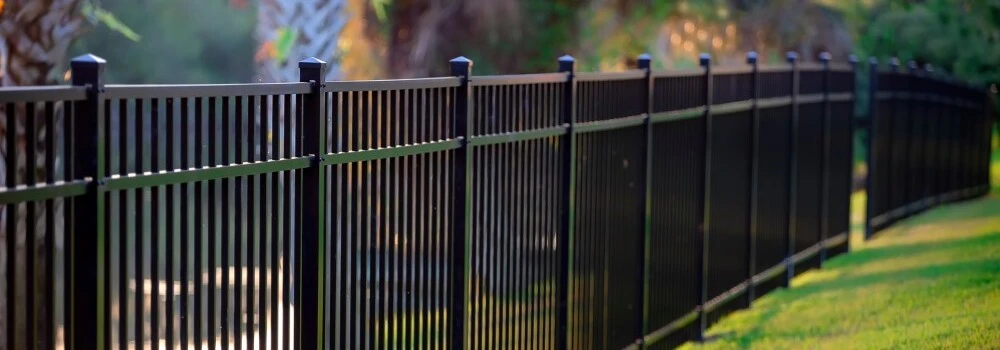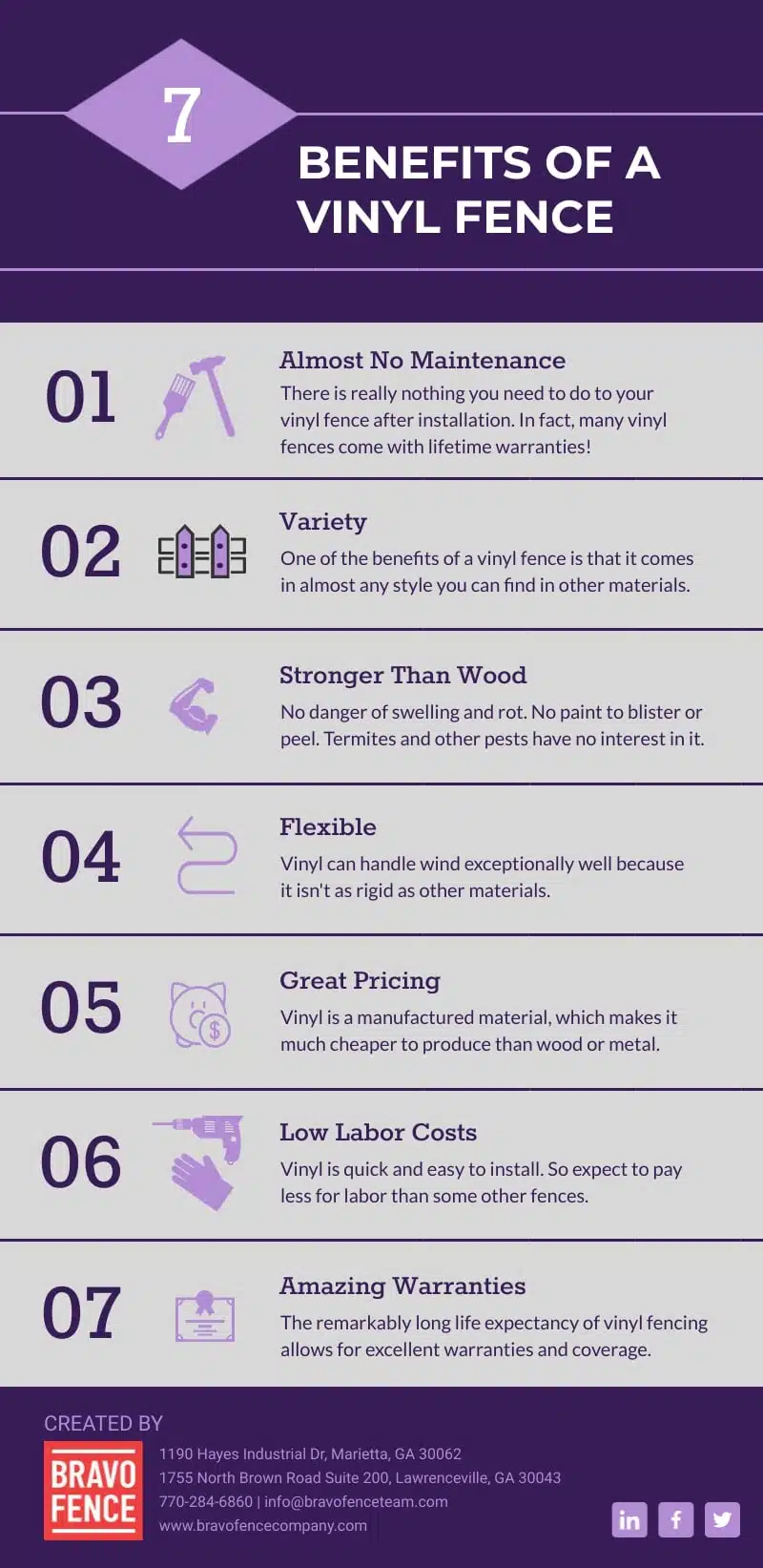
The Benefits of a Vinyl Fence
Traditionally, fences are made out of metal or wood. But new materials have revolutionized fencing. Composites are a great alternative to traditional wood fences. But for even more durability and savings, there is no comparison to the benefits of a vinyl fence. Vinyl is the most durable, lowest maintenance, and most cost-effective fence material out there. It’s no surprise that more and more homeowners and businesses are turning to vinyl fencing. Here are just a few of the great benefits of vinyl fencing.
1. Almost No Maintenance
Most fences require significant maintenance. Traditional metal fences, such as wrought iron, need to be inspected for rust, sanded, and repainted. The maintenance is labor-intensive and the costs can add up. And that’s on top of the already high price tag for wrought iron. If wood is more your style, expect a good deal of upkeep. Even treated pine and high-end woods are vulnerable to weather over time. Wood fences often need repairs, and even the best wood fences will eventually succumb to the combined ravages of sun, temperature changes, and rot. If you plan to install a traditional material fence, there is really no way around maintenance costs. Some materials are less costly to maintain than others, but you should always budget for the ongoing expenses.
Vinyl is in a completely different category when it comes to maintenance. When we say that vinyl is low-maintenance, we mean it. There is really nothing you need to do to your vinyl fence after installation. In fact, many vinyl fences come with lifetime warranties! Vinyl fencing comes in a wide variety of colors, so there is no need to paint and no paint to peel.
2. Variety
When vinyl fencing first came on the scene, it was only available in a few styles. Today, however, it’s an entirely different story. One of the benefits of a vinyl fence is that it comes in almost any style you can find in other materials. The most common vinyl fence style is a privacy fence. And if you can do it with wood, you can do it with vinyl. Vinyl fences typically come in complete sections, so there is no gap between boards. Wood can often develop gaps and knots can become holes. With vinyl, that will never happen. Vinyl doesn’t rot, dry out, or fade. You can pick the style and color you like, and your fence will stay that way for as long as you keep it.
But if you thought that vinyl is only suitable for privacy fences, you’ll be surprised at the variety of modern vinyl fencing. Vinyl fencing is available as decorative picket fencing and even post-and-rail fencing.
3. Vinyl is Stronger Than Wood
Vinyl can stand up to punishment that would severely damage a wood fence. One of the most common sources of damage to wood fences is moisture. Even pressure-treated wood can absorb moisture over time. That can cause swelling that eventually rips apart a wood fence. Moisture also leads to rot, another common reason for wood fence repairs and replacement. If a wood fence is painted, the paint can peel or blister. Wood fences are also susceptible to attack from termites and other burrowing insects, like carpenter bees and carpenter ants.
Vinyl fences don’t absorb moisture. There is absolutely no danger of swelling and rot. There is no paint to blister or peel. And Because vinyl is not an organic material, termites and other pests have no interest in it.
4. Vinyl is Flexible
Unlike wood or metal, vinyl is flexible. That doesn’t mean your fence will be twisting and flapping. But if you live somewhere with high winds, vinyl is a great option. In the Southeast, storms are often accompanied by strong wind gusts. Vinyl can handle wind exceptionally well because it isn’t as rigid as other materials.
5. Great Pricing
Vinyl isn’t just impervious to many forms of damage. And it doesn’t just last forever with minimal maintenance. In addition to those benefits, one of the significant benefits of a vinyl fence is the cost. Vinyl is one of the lowest-cost materials available for fences. Vinyl is a manufactured material, which makes it much cheaper to produce than wood or metal.
The minimal maintenance required by a vinyl fence also makes it extremely cost-effective over time. Wood and metal fences need maintenance and repairs, such as painting, staining, and even replacing parts of the fence. Those costs can add up over the life of your fence. When you add in those costs, the final price tag over the life of your fence can be pretty high. But vinyl needs almost no maintenance, which means practically no additional investment after the initial installation.
6. Low Labor Costs
Vinyl is quick and easy to install. So when you hire a fence installation company like Bravo Fence Company, you can expect to pay less for labor than some other fences. Some heavy fences, like wrought iron, are difficult to work with. They take longer to install and generally require more labor. Unlike wood, you won’t pay for painting or staining with vinyl. Vinyl comes from the manufacturer in the color of your choice. There is no need to add anything after the initial installation.
7. Amazing Warranties
Most fences come with a limited warranty. The warranty length is based on the expected lifespan of the particular fence material. But vinyl fences often come up with much more extensive warranties. Lifetime warranties on vinyl are not uncommon. One of the benefits of a vinyl fence is its longevity, even with minimal maintenance. The remarkably long life expectancy of vinyl fencing allows for excellent warranties and coverage.
Enjoy the Benefits of a Vinyl Fence
If you want to enjoy the benefits of a vinyl fence, contact Bravo Fence Company to schedule your free estimate. We can help you envision the perfect fence for your home or business. Then we prepare a detailed quote for your fence. If you choose vinyl, we can tell you precisely what it will cost and how much you will save. So if you’re thinking about building or replacing a fence, consider the benefits of a vinyl fence.


